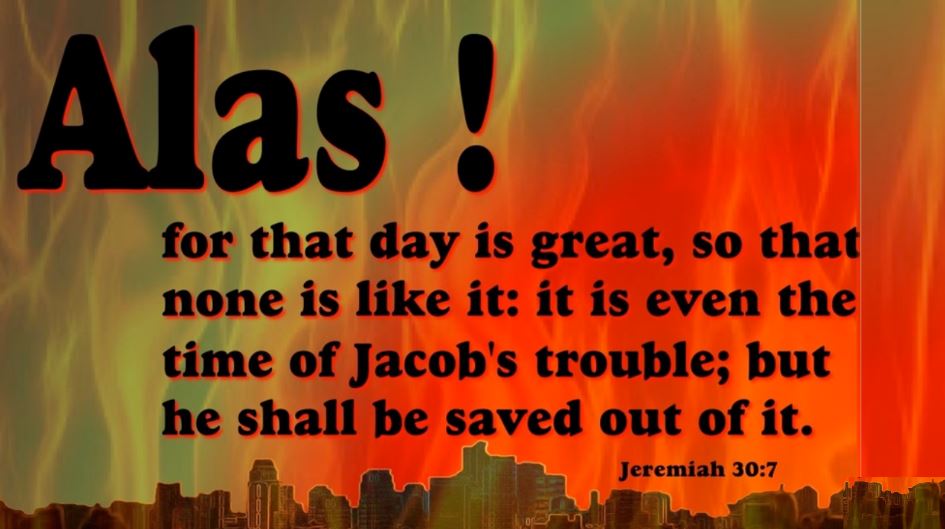 Related Articles
Related Articles
|
|
|
 Websites
Websites
|
|
|
|
|
The Time of Jacob's Trouble
The Time of Jacob's Trouble is one which is debated. Here Philip Wren of Trumpet Sounds offers some comment.
 Jacob’s Trouble: is it past or future? Jacob’s Trouble: is it past or future?
Jesus warned that at the end of this age there will be a time of “great tribulation, such as has not been since the beginning of the world”. He goes on to state that the time will be so severe that, “unless the days are shortened no flesh will be saved.” (Matt. 24:21, 22). This time immediately precedes the return of Jesus to this earth.
Frequently this time of intense tribulation is said to correspond to ‘the time of Jacob’s trouble’ prophesied in Jeremiah 30: 7. But is it the same?
I believe that many who support Israel have been troubled by the thought that we are sending the Jews back to the land to face a time of trouble worse than the Holocaust. If that is what lies ahead surely they would be better off remaining in the gentile nations?
The aiding of the return has been justified by the regret that it is only after this final time of trouble that Israel would repent and acknowledge Jesus as their Messiah. On that day they would cry out, “Baruch Ha'ba B'Shem Adonai”, “Blessed is He who comes in the name of the Lord." (Matt. 23:39)
Setting Israel free
The time of Jacob’s trouble is described in Jeremiah 30:4-7. “Now these are the words that the LORD spoke concerning Israel and Judah. “For thus says the LORD: ‘We have heard a voice of trembling, of fear, and not of peace. Ask now, and see, whether a man is ever in labour with child? So why do I see every man with his hands on his loins like a woman in labour, and all faces turned pale? Alas! For that day is great, so that none is like it; and it is the time of Jacob’s trouble, but he shall be saved out of it.”
The prophecy describes a time of intense distress after which Jacob will be set free. The Jews will no longer be under the yoke of other nations. The prophecy continues: “For it shall come to pass in that day,’ says the LORD of hosts, ‘That I will break his yoke from your neck, and will burst your bonds; foreigners shall no more enslave them. But they shall serve the LORD their God, and David their king, whom I will raise up for them.” (Jer.30:8, 9)
Serving the Lord their God and David their king is clearly future. It belongs to the time after Jesus’ return. We understand that ‘David their King’ refers to Jesus who is a direct descendant of King David and will sit on David’s throne. It is at the time when He, Jesus, has rescued Israel from the nations of the world which have come up to attack Jerusalem. The words, “in that day”, tie the time of trouble to the period when Israel will be free and worship the Lord their Messiah. The day is not a literal day but denotes a time period in which God acts.
A unique event
The time of Jacob’s trouble is unique. As the Bible says “there is none like it”. There are a number of other places in the Bible where events are described as unlike anything which has occurred in the past or will occur in the future.
In Daniel 12:1 we are told that, ”there will be a time of trouble, such as never was since there was a nation. Even to that time and at that time your people shall be delivered.” The context is the time of the reign of the king of the North and his entry into the Holy Land. That this is a time of conflict is confirmed in verse 7 which reads. “when the power of the holy people has been completely shattered all these things shall be finished.” Is this another description of Jacob’s trouble? There is a contrast in the two accounts.
In Jeremiah, Israel and Judah come across as helpless. In Daniel they are referred to as a nation which has the power to defend its self although in the end it is shattered.
Ezekiel 5:9 refers to the destruction of Jerusalem to as a unique event. “And I will do among you what I have never done, and the like of which I will never do again”.
Another reference to an unparalleled time of trouble is found in Joel 2:1,2. Here it refers to the gathering of a great army which brings with it total devastation. Later in Joel we read of the nations being gathered to the valley of decision. It is described as, “the like of whom has never been; nor will there ever be any such after them, even for many successive generations.”
The climactic battle which will close this age will be unlike anything that has preceded it. Many generations will pass before another similar battle closes the millennial age. Both battles have the aim of destroying God’s rule over the earth. Jesus also spoke of a time unlike any other. “For then there will be a great tribulation, such as has not occurred since the beginning of the world until now, nor ever will.” (Matt. 24:21)
The starting point for this time of tribulation is the “abomination of desolation in the holy place”. To emphasise that this is the prelude to an appalling time of suffering, all in Judea are to flee. Jesus adds that, “unless those days were shortened no flesh would be saved.” Is this the time of Jacob’s trouble? I do not think so.
Although the warning sign that it is beginning comes out of Israel (Matt. 24:15), the great Tribulation is a global event, while Jacob’s trouble is focused on the Jews. The Bible even indicates that unlike the time of Jacob’s trouble there will be a place of safety for the Jews during the Great Tribulation (Matt. 24:16, Rev. 12;14). Those who heed Jesus’ warning are to flee Jerusalem and head for the mountains.
Another place of safety
In 70 AD the Roman armies surrounded Jerusalem. After a few days they withdrew. The Jerusalem church acted on the warning that Jesus had given. During the brief interlude when the armies of Rome had withdrawn, they left the city. Guided by a word of prophecy they fled to Pella across the Jordan. Soon Rome was back. There was no escape for those who stayed.
Note: that whereas the prophecy of Jerusalem being surrounded by armies (Luke 21:20) was fulfilled in 66 AD the abomination of desolation prophecy (Matt. 24:15) was not fulfilled at that time.
There are other Biblical events which are unique. We could list the confusion of the languages at Babel, the destruction of Sodom and Gomorrah, and most notably the global flood. Each of these was a divine intervention the like of which has never and will never be repeated. Therefore to link the events described in Daniel, Ezekiel, Joel or Matthew to Jeremiah on the basis that they each describe a time of exceptional trouble is unwarranted. Each of the events is unique in its own way.
There will be a time of trouble for Israel at the end of this age, but it is not necessarily ‘Jacob’s trouble’. Which brings us back to the question is Jacob’s trouble past or future? Jeremiah chapters 30 to 31 are about the restoration of Israel. In chapter 30 Jeremiah is commanded by God to write a book. The theme of the book is the restoration of Israel to their land after a time of captivity.
We quickly realise that this is not a book about the return from Babylon. It has a much greater fulfillment in mind. It is about the nation’s reconciliation to God. Jacob’s trouble is the trigger which starts the process whereby Israel is restored and eventually receives her king.
Zechariah
Another passage which is often linked to the time of Jacob’s trouble is Zechariah 13:8,9, “And it shall come to pass in all the land, Says the LORD, That two-thirds in it shall be cut off and die, But one-third shall be left in it:” The reason given for this destruction is that it will be a refining process. Is the fulfillment of this prophecy past or future?
The prophecy ends with the remnant being refined and responding “The Lord is my God”. With the surrounding prophecies having a second coming emphasis it is easy to assume that the whole of this prophecy is also set at that time. But the prophecy starts with the sacrifice of Christ. Jesus applied the words, “Strike the shepherd and the sheep will be scattered;” to Himself (Matt.26:31).
Somewhere between the first and second comings the terrible time of destruction must occur.
The time of trouble appears to flow on as a result of the scattering of the sheep. This would make it a reference to the destruction brought about by the Romans in 66 to 70 AD. The “Then” in verse seven implies that the two thirds will be cut off as a consequence of the Shepherd being struck. This was more than fulfilled in the savage destruction of the Jewish nation by the Romans. First in 67 to 70 AD and then in the later Bar Kokhba rebellion of 132 to 135 AD.
Elsewhere in Zachariah we find prophecies which flow seamlessly from period to another. For example in Chapter 9 verses 9 and 10 we have both the first and second comings.
The turning point from past to future could be at the beginning of verse 9: “I will bring the one third through the fire”. Did the Holocaust fulfill this prophecy of Jacob’s trouble? The one third being those who survived the holocaust to form the nation which exist today. The prophecy foresees a final time of testing for Israel. How we will rejoice if the first part of this particular prophecy is counted as fulfilled and not part of Israel’s future refining.
Note: The word translated ‘the land’ (Zechariah 13: 8) is also translated in Zechariah as the earth’. Thus giving a much broader field for the fulfillment of the prophecy.
 Philip Wren is a retired architect and produces the Trumpet Sounds quarterly newsletter. He writes for Sword Magazine and was part of the End Times Symposium which (inter alia) touched on the timing of Jacob's Trouble. This article first appeared in Trumpet Sounds: 2nd quarter 2024. Philip Wren is a retired architect and produces the Trumpet Sounds quarterly newsletter. He writes for Sword Magazine and was part of the End Times Symposium which (inter alia) touched on the timing of Jacob's Trouble. This article first appeared in Trumpet Sounds: 2nd quarter 2024. |
Philip Wren, 12/05/2024
|
|
|
|